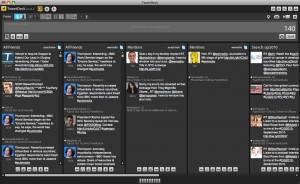The future of documents
 A few weeks ago I recorded a conversation about the future of documents with Francois Ragnet, an internal champion of big ideas at Xerox Global Services.
A few weeks ago I recorded a conversation about the future of documents with Francois Ragnet, an internal champion of big ideas at Xerox Global Services.
As you can well imagine, the future of documents is more than a curiosity for a company famous for its Palo Alto Research Center (Xerox Parc) and world-changing computing innovations such as the graphical user interface and computer mouse – but still synonymous with copying machines. Today Xerox is a major provider of consulting and outsourced printing for big companies that churn out boatloads of paper.
 Among other things, Francois and I discussed how social media and the changing nature of the document enable a new kind of workplace powered by real-time knowledge sharing and perpetual creativity. We’re already seeing the rise of the networked work experience. Legions of loosely organized, cloud-powered solo entrepreneurs, contractors and free agents work at home, in coffee shops and in co-working collaboration hubs like our own WeSpace in Reston, Virginia.
Among other things, Francois and I discussed how social media and the changing nature of the document enable a new kind of workplace powered by real-time knowledge sharing and perpetual creativity. We’re already seeing the rise of the networked work experience. Legions of loosely organized, cloud-powered solo entrepreneurs, contractors and free agents work at home, in coffee shops and in co-working collaboration hubs like our own WeSpace in Reston, Virginia.
What does all that have to do with documents?
Here’s a starting point: Our culture is built around documents. Whether it’s contracts, invoices, magazines, Microsoft Word or Google docs, legal records, blog posts, cave paintings, paychecks or even cash, it’s hard to imagine organized society without something that looks or acts or at least represents a collection of words, numbers, pictures and ideas fashioned into a human-readable format that we call a document.
I can imagine paperless news and a paperless workplace. I can’t imagine a society without documents.
What’s worse, the more I think about it, the less sure I am of exactly what I mean by the term “document.”
As the information required to organize our lives becomes more distributed, atomized, personalized and streamed, like magic, from unseen computers in the invisible digital cloud, the distinctions between disorganized data, loosely organized content, curated documents and full-fledged media experiences – or products – becomes fuzzier. Is a Tweetdeck dashboard, which displays a realtime stream of Twitter updates, a document? How about a screenshot of it? What about a Google Docs spreadsheet shared and updated continuously by a distributed work group, or a personalized newsletter delivered to your email inbox and posted to your Facebook wall – where friends “like” it and add comments?
What, exactly, is a “document” in a world of apps, screens and perpetually changing representations of information? Storify, a new web service, helps people create documents of documents – it’s a drag-and-drop tool to collect content from whatever online sources they like (Or, so it appears from what I’ve seen of it – I’m still awaiting access to the private beta so I can give it a try).
We know intuitively what we mean by a physical document, but what about information, knowledge and ideas that are not fixed in space and time? They’re revised, redacted, retracted, redesigned and refreshed continuously – like the advertisements and futuristic edition of USAToday from the 2002 movie Minority Report.
Of course, a digital newspaper, even on fabulous e-ink that’s vastly more capable than what you get now with a Kindle, is a modest mental leap forward from a world already hooked on the web, mobile apps, iPads and the like. But packaged news is just one kind of document, it’s already digital, ephemeral and hardly the most important document in our lives. How about your medical records, photo collections or online banking records?
What happens when realtime touches everything?
Have a listen, then please add your thoughts.
The podcast is broken into four parts, or click here to listen to the entire conversation.
Part One
What is a document in the age of social media? Is it time to update your definition?
Listen
Part Two
How will “social documents” impact organizations and knowledge workers?
Listen
Part Three
What are the social implications of virtual work?
Is there a clear vision for a cloud-based, app-driven workplace?
Listen
Part Four
What will become of security and privacy in an information overloaded world?
Listen
—
Photo Credit: By Ludovic Bertron




